人教版八年级上册英语复习
- 格式:docx
- 大小:457.16 KB
- 文档页数:17
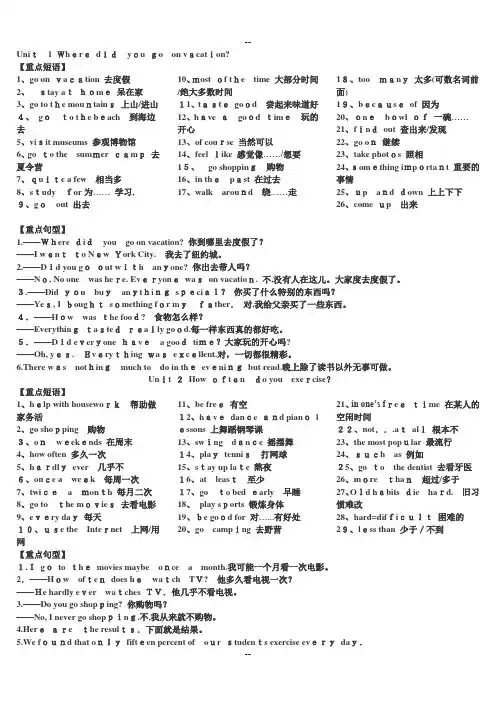
Unit 1 Wheredidyou go on vacation? 【重点短语】1、go on vacation 去度假2、stay athome呆在家3、go to the mountains上山/进山4、goto the beach到海边去5、visit museums 参观博物馆6、go to the summer camp去夏令营7、quite a few相当多8、studyfor为…… 学习,9、goout 出去10、most of the time 大部分时间/绝大多数时间11、tastegood尝起来味道好12、have agood time玩的开心13、of course 当然可以14、feel like 感觉像……/想要15、go shopping购物16、in thepast 在过去17、walk around绕……走18、toomany太多(可数名词前面)19、becauseof 因为20、onebowl of一碗……21、findout 查出来/发现22、go on继续23、take photos 照相24、something important 重要的事情25、up and down 上上下下26、come up出来【重点句型】1.——Where didyou go on vacation? 你到哪里去度假了?——I wentto New York City.我去了纽约城。
2.——Did you goout with anyone? 你出去带人吗?——No, No one was here. Everyonewason vacation. 不,没有人在这儿。
大家度去度假了。
3.——Did you buyanythingspecial?你买了什么特别的东西吗?——Yes, I boughtsomething for myfather.对,我给父亲买了一些东西。
4.——How was the food?食物怎么样?——Everythingtastedreally good.每一样东西真的都好吃。
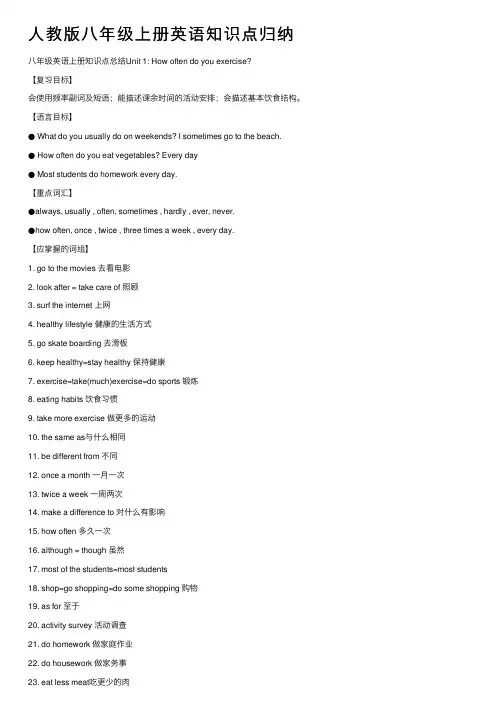
⼈教版⼋年级上册英语知识点归纳⼋年级英语上册知识点总结Unit 1: How often do you exercise?【复习⽬标】会使⽤频率副词及短语;能描述课余时间的活动安排;会描述基本饮⾷结构。
【语⾔⽬标】● What do you usually do on weekends? I sometimes go to the beach.● How often do you eat vegetables? Every day● Most students do homework every day.【重点词汇】●always, usually , often, sometimes , hardly , ever, never.●how often, once , twice , three times a week , every day.【应掌握的词组】1. go to the movies 去看电影2. look after = take care of 照顾3. surf the internet 上⽹4. healthy lifestyle 健康的⽣活⽅式5. go skate boarding 去滑板6. keep healthy=stay healthy 保持健康7. exercise=take(much)exercise=do sports 锻炼8. eating habits 饮⾷习惯9. take more exercise 做更多的运动10. the same as与什么相同11. be different from 不同12. once a month ⼀⽉⼀次13. twice a week ⼀周两次14. make a difference to 对什么有影响15. how often 多久⼀次16. although = though 虽然17. most of the students=most students18. shop=go shopping=do some shopping 购物19. as for ⾄于20. activity survey 活动调查21. do homework 做家庭作业22. do housework 做家务事23. eat less meat吃更少的⾁24. junk food 垃圾⾷物25. be good for 对什么有益26. be bad for 对什么有害27. want to do sth 想做某事28. want sb to do sth 想某⼈做某事29. try to do sth 尽量做某事30. come home from school 放学回家31. of course = certainly = sure 当然32. get good grades 取得好成绩33. some advice34. hardly=not nearly / almost not ⼏乎不35. keep/be in good health 保持健康36. b e stressed out 紧张的,有压⼒的37. take a vacation 去度假48. g et back 回来【应掌握的句⼦】1. How often do you exercise? 你(你们)多久锻炼⼀次⾝体?How often + 助动词do(does 或did) + 主语+ do sth.? 疑问词how often 是问频率(多久⼀次),(在这⾥助动词do(does 或did) 是起帮助构成疑问的作⽤)与⼀般现在时或⼀般过去时连⽤,回答⼀般是⽤表⽰频率的副词,如:once, twice, three times , sometimes, often, quite, often, never, every day, once a week , twice a month , three times a month , three or four times a month 等。
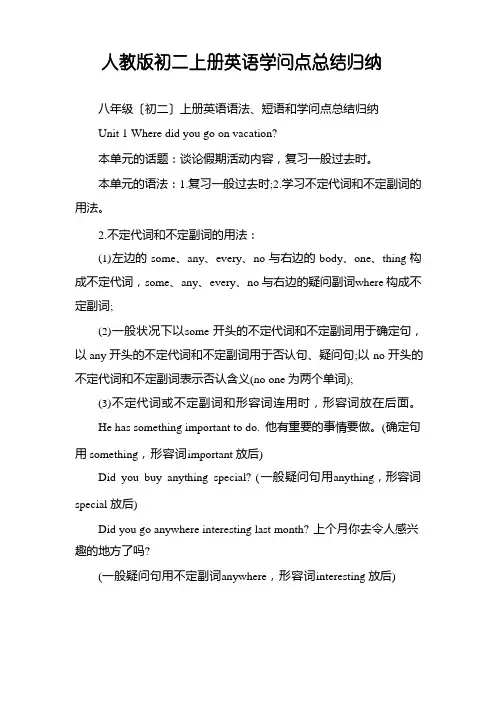
人教版初二上册英语学问点总结归纳八年级〔初二〕上册英语语法、短语和学问点总结归纳Unit 1 Where did you go on vacation?本单元的话题:谈论假期活动内容,复习一般过去时。
本单元的语法:1.复习一般过去时;2.学习不定代词和不定副词的用法。
2.不定代词和不定副词的用法:(1)左边的some、any、every、no 与右边的body、one、thing 构成不定代词,some、any、every、no 与右边的疑问副词where 构成不定副词;(2)一般状况下以some 开头的不定代词和不定副词用于确定句,以any 开头的不定代词和不定副词用于否认句、疑问句;以no 开头的不定代词和不定副词表示否认含义(no one 为两个单词);(3)不定代词或不定副词和形容词连用时,形容词放在后面。
He has something important to do. 他有重要的事情要做。
(确定句用something,形容词important 放后)Did you buy anything special? (一般疑问句用anything,形容词special 放后)Did you go anywhere interesting last month? 上个月你去令人感兴趣的地方了吗?(一般疑问句用不定副词anywhere,形容词interesting 放后)(4)不定代词和不定副词做主语时,后面的动词用单数形式。
Everone is here today.今日每个人都在这里。
本单元的短语和学问点:1.go on vacation 去度假go to the mountains 上山/进山2.s tay at home 呆在家go to the beach 去海滩visit museums 参观博物馆go to summer camp 去参观夏令营3. study for tests 为考试而学习\备考go out 出去4. quite a few 相当多,不少(后跟可数名词复数)take photos 照相most of the time大局部时间5.buy sth for sb = buy sb sth为某人买某物6.taste good. 尝起来很好taste(尝起来)、look(看起来)、sound(听起来)为感官动词,后跟形容词7.h ave a good\great\fun time 过得快活,玩得开心(=enjoy oneself) 8. go shopping 去购物9. nothing…but+动词原形:除了……之外什么都没有He had nothing to do at home but read yesterday.昨天他在家除了读书无事可做。
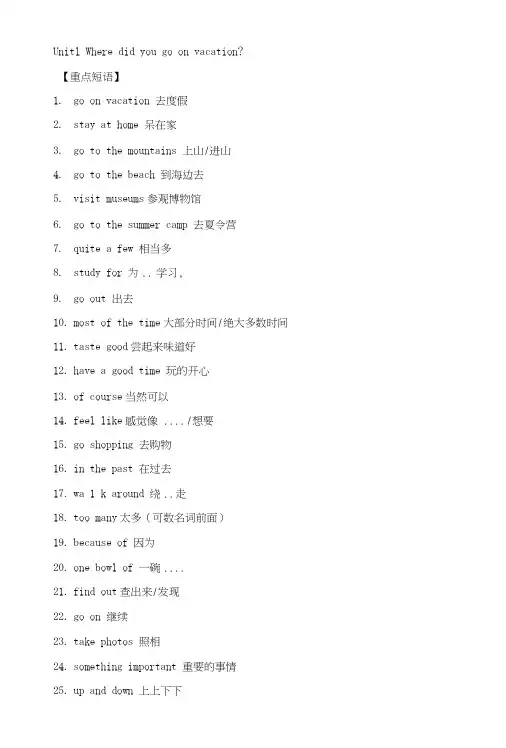
Unitl Where did you go on vacation?【重点短语】1.go on vacation 去度假2.stay at home 呆在家3.go to the mountains 上山/进山4.go to the beach 到海边去5.visit museums参观博物馆6.go to the summer camp 去夏令营7.quite a few 相当多8.study for 为.. 学习,9.go out 出去10.most of the time大部分时间/绝大多数时间11.taste good尝起来味道好12.have a good time 玩的开心13.of course当然可以14.feel like感觉像 .... /想要15.go shopping 去购物16.in the past 在过去17.wa 1 k around 绕.. 走18.too many太多(可数名词前面)19.because of 因为20.one bowl of 一碗....21.find out查出来/发现22.go on 继续23.take photos 照相24.something important 重要的事情25.up and down 上上下下e up 出来【重点句型】1.--- Where did you go on vacation? 你到哪里去度假了?--- 1 went to New York City. 我去了纽约城。
2.--- Did you go out with anyone? 你出去带人吗?--- No, No one was herc. Everyone was on vacation. 不,没有人在这儿。
大家度去度假了。
3.--- Did you buy anything special? 你买了什么特别的东西吗?--- Yes, I bought something for my father.对,我给父亲买了一些东西。
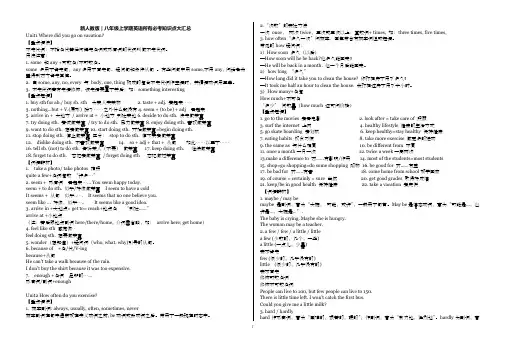
新人教版|八年级上学期英语所有必考知识点大汇总Unit1 Where did you go on vacation?【重点语法】不定代词:不指名代替任何特定名词或形容词的代词叫做不定代词。
用法注意:1. some 和any +可数名/不可数名。
some 多用于肯定句,any多用于否定句、疑问句和条件从句。
有些问句中用some,不用any, 问话者希望得到对方肯定回答。
2. 由some, any, no, every 与body, one, thing构成的复合不定代词作主语时,其谓语动词用三单。
3. 不定代词若有定语修饰,该定语要置于其后:如:something interesting【重点短语】1. buy sth for ab./ buy sb. sth 为某人买某物2. taste + adj. 尝起来……3. nothing...but + V.(原形) 除了……之外什么都没有4. seem + (to be) + adj 看起来5. arrive in + 大地方/ arrive at + 小地方到达某地6. decide to do sth. 决定做某事7. try doing sth. 尝试做某事/ try to do sth. 尽力做某事8. enjoy doing sth. 喜欢做某事9. want to do sth. 想去做某事10. start doing sth. 开始做某事=begin doing sth.11. stop doing sth. 停止做某事区分:stop to do sth. 停下来去做某事12. dislike doing sth. 不喜欢做某事14. so + adj + that + 从句如此……以至于……16. tell sb. (not) to do sth. 告诉某人(不要)做某事17. keep doing sth. 继续做某事18. forget to do sth. 忘记去做某事/ forget doing sth 忘记做过某事【词语辨析】1. take a photo/ take photos 拍照quite a few+名词复数“许多…”2. seem + 形容词看起来…... You seem happy today.seem + to do sth. 似乎/好像做某事I seem to have a coldIt seems + 从句似乎..…. It seems that no one believe you.seem like ... 好像,似乎….. It seems like a good idea.3. arrive in +大地点= get to= reach+地点名“到达......”arrive at +小地点(注:若后跟地点副词here/there/home, 介词需省略,如:arrive here; get home)4. feel like sth 感觉像…feel doing sth. 想要做某事5. wonder(想知道)+疑问词(who, what, why)引导的从句。
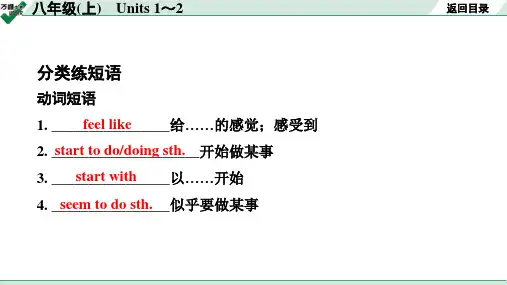
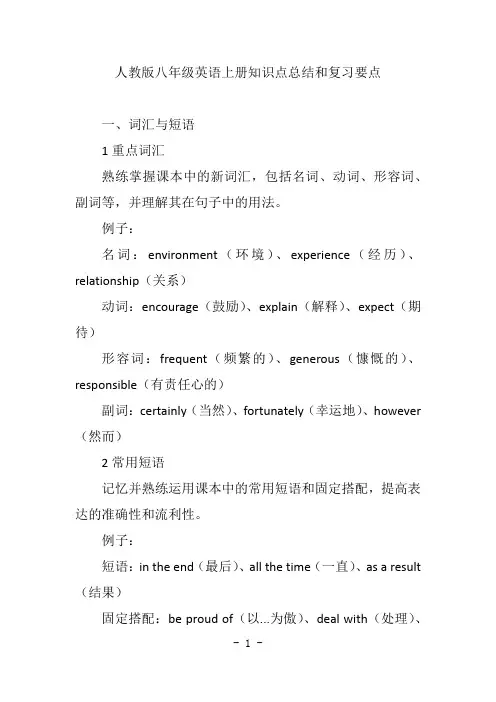
人教版八年级英语上册知识点总结和复习要点一、词汇与短语1重点词汇熟练掌握课本中的新词汇,包括名词、动词、形容词、副词等,并理解其在句子中的用法。
例子:名词:environment(环境)、experience(经历)、relationship(关系)动词:encourage(鼓励)、explain(解释)、expect(期待)形容词:frequent(频繁的)、generous(慷慨的)、responsible(有责任心的)副词:certainly(当然)、fortunately(幸运地)、however (然而)2常用短语记忆并熟练运用课本中的常用短语和固定搭配,提高表达的准确性和流利性。
例子:短语:in the end(最后)、all the time(一直)、as a result (结果)固定搭配:be proud of(以...为傲)、deal with(处理)、pay attention to(注意)二、句型与语法1基本句型熟练掌握五种基本句型,包括主语+谓语、主语+谓语+宾语、主语+谓语+间接宾语+直接宾语、主语+谓语+宾语+宾语补足语、主语+系动词+表语。
例子:主语+谓语:She sings.(她唱歌。
)主语+谓语+宾语:I like apples.(我喜欢苹果。
)主语+谓语+间接宾语+直接宾语:He gave me a book.(他给了我一本书。
)主语+谓语+宾语+宾语补足语:I found the book interesting.(我发现这本书很有趣。
)主语+系动词+表语:She is beautiful.(她很漂亮。
)2时态深入学习并掌握现在完成时、过去进行时、一般将来时、过去将来时等时态的用法和形式。
例子:现在完成时:I have already seen that movie.(我已经看过那部电影了。
)过去进行时:They were playing football when I called them.(我打电话给他们时,他们正在踢足球。
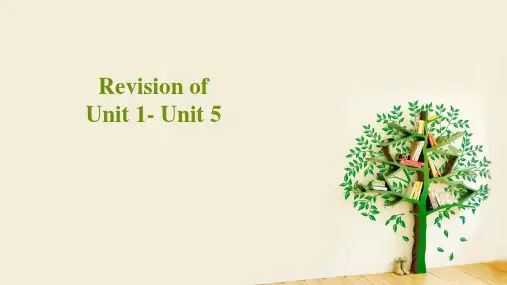
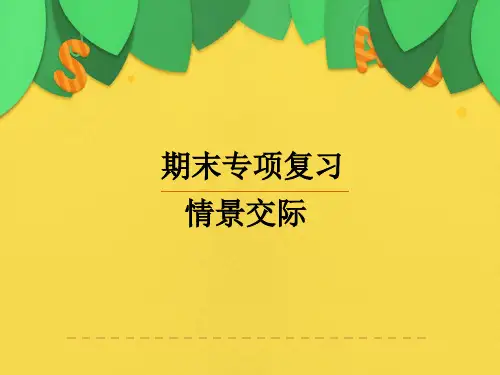
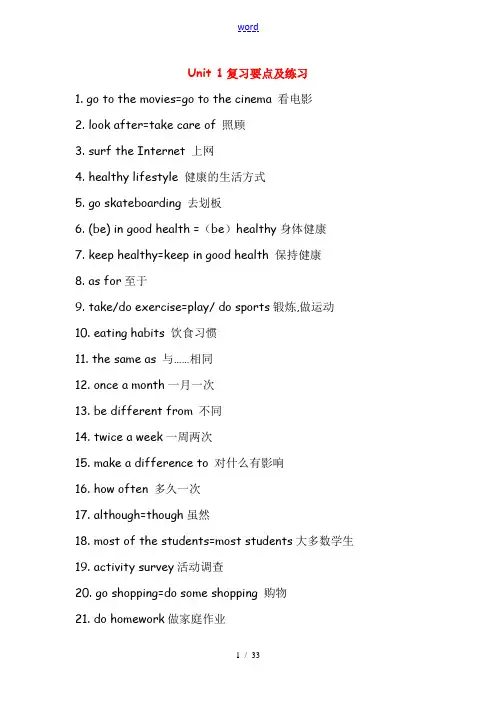
Unit 1复习要点及练习1. go to the movies=go to the cinema 看电影2. look after=take care of 照顾3. surf the Internet 上网4. healthy lifestyle 健康的生活方式5. go skateboarding 去划板6. (be) in good health =(be)healthy身体健康7. keep healthy=keep in good health 保持健康8. as for至于9. take/do exercise=play/ do sports锻炼,做运动10. eating habits 饮食习惯11. the same as 与……相同12. once a month一月一次13. be different from 不同14. twice a week一周两次15. make a difference to 对什么有影响16. how often 多久一次17. although=though虽然18. most of the students=most students大多数学生19. activity survey活动调查20. go shopping=do some shopping 购物21. do homework做家庭作业22. do housework做家务事23. junk food垃圾食物24. be good/bad for 对……有益(害)25. on/at weekends 在周末26. want to do sth=would like to do sth=feel like doing sth 想要做某事27. want sb to do sth= would like sb to do sth想要某人做某事28. try to do sth 尽量做某事29. e home from school放学回家30. of course=certainly=sure当然31. get good grades取得好成绩32. help sb (to )do sth 帮助某人做某事,33. help sb with sth在某方面帮助某人34. a lot of =lots of=many /much许多,大量的Unit 1重点句型:1. -What do you usually do on weekends?-I usually go to the movies.2. -What does he sometimes do on weekends? -He sometimes surfs the Internet.3. How often do you exercise?I exercise once a week.4. How often does she eat vegetables?She eats vegetables three times a day.5. Most of the students go to the beach every year.6. It makes a big difference to my grades.7. My eating habits are pretty good.Unit 1语法:1. 表频率的词汇和短语:always \usually \often \never hardly ever\ sometimes \seldom(很少)\once a day \twice a month \three times a week\ every two weeks(每隔一周)2. 做事情的频率(how often you do things):-What do you usually do in the morning?-I usually read English books. \Sometimes I walk in the garden. \I hardly ever exercise.\ I eat vegetables twice a week, but I never eat junk food.3. 如何提问频率“多久一次”-How often does he play tennis?-He plays tennis every day.-How often do you drink milk?-I drink milk once a day.-How often do they go to the movies?-Sometimes.一、单选( ) 22. — How often does your father go fishing? (P2)— About _________.A. one monthB. two timesC. once a monthD. twice( ) 23. — What are the results ______ “surf the Internet” in the survey? (P3)—I am not sure. You’d better ask Linda.A. atB. forC. offD. in( ) 24. — What is Bill like?— He is very _____. He exercises every day. (P3)A. lazyB. busyC. quietD. active( ) 25. — ______ do you eat vegetables, Katrina?— I eat vegetables every day. (P2)A. How oftenB. How muchC. How manyD. How long( ) 26. —You are kind of unhealthy, Tom. You should eat __________ healthy food.—Thanks. I’m trying _____ a lot of vegetables.(P5)A. more; eatB. less; eatC. more; to eatD. less; to eat( ) 27. — Who _____ your little sister when your mother goes to work? (P5)— Always my grandma does, and sometimes I do.A. looks forB. looks afterC. takes careD. takes away( ) 28. —Ann, your brother is unhealthy. Is your lifestyle ______ his?—No, I’m ____ him. I’m very healthy. (P5)A. different from; the same asB. different from; different fromC. the same as; different fromD. the same as; the same as( ) 29. — What do you think of playing basketball? (P3)— Exciting. And _____ boys in our class are interested in it.A. everyB. mostC. hardlyD. no( ) 30. — Why can you keep in good _____, Mr Wang? (P6)— Because I have _________ eating habits.A. health; healthB. healthy; healthyC. health; healthyD. healthy; healthB. 用所给单词的适当形式填空,使句子完整、通顺。
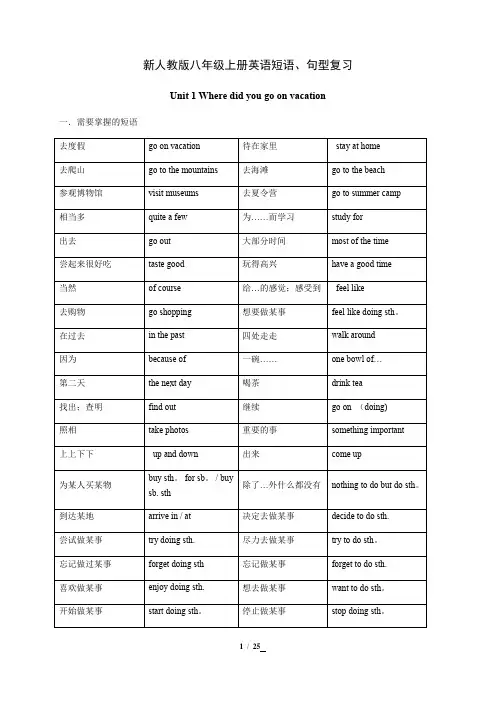
新人教版八年级上册英语短语、句型复习
Unit 1 Where did you go on vacation 一.需要掌握的短语
二.需要掌握的句型
Unit 2 How often do you exercise?一.需要掌握的短语。
二.需要掌握的句型
Unit 3 I’m more outgoing than my sister.一.需要掌握的短语
二.需要掌握的句型
Unit 4 What’s the best movie theater?
一.需要掌握的短语
二.需要掌握的句型
Unit 5 Do you want to watch a game show?一.需要掌握的短语
二.需要掌握的句型
Unit 6 I’m going to study computer science。
一.需要掌握的短语
二.需要掌握的句型
Unit 7 Will people have robots?一.需要掌握的短语
二.需要掌握的句型
Unit 8 Will people have robots?一.需要掌握的短语
二.需要掌握的句型
Unit 9 Can you come to my party?一.需要掌握的短语
二.需要掌握的句型。
第一单元重点语法【一般过去时】1.概念:表示过去某个时间里发生的动作或状态;过去习惯性、经常性的动作、行为;过去主语所具备的能力和性格。
2.时间标志词1. yesterday, the day before yesterday2. 时间段+ago: three years ago, long ago…3. last: last day/ week/ year…4. in+过去年份: in 2015…5. just now 刚才【复合不定代词】复合不定代词是由some-,any-,no-,every-加上-one,-body,-thing等所组成的不定代词。
例如:Everyone wants to win.考向二:复合不定代词被形容词修饰,形容词后置例如:I have something interesting to tell you.考点三:辨析something/someone/somebody,anything/anyone/anybody,nothing/noone/nobody,everything/everyone/everybody1.something,someone,somebody通常用于肯定句中2.anything,anyone,anybody一般用于否定句、疑问句或条件状语从句中。
3. not....anything = nothing注意:1)在表示请求、邀请、提建议等带有委婉语气的疑问句,和希望得到对方肯定答复的疑问句,以及表示反问的问句中,也用something,someone,somebody等复合不定代词。
如:Would you like something to eat?2)当anything表示“任何事(物),无论何事(物)”,anyone,anybody表示“无论谁,任何人”等意义时,它们也可以用于肯定句中。
如:Anybody knows the answer.任何人都知道答案。
人教版新目标八年级上册英语期中复习知识重点一、Unit1-5词汇高频考点1.decide v.决定名词形式:decision构成短语:decide (not) to do sth.make a decision to do sth.2.wonder v.想知道相当于want to know,后面常接名词,后面如果接句子必须用陈述句语序3.bored adj.厌倦的bored表示“(人)感觉厌倦的”boring表示“(事物)使人厌倦的,无聊的”类似的词语:interested—interesting;surprised—surprising;tired—tiring;excited—exciting;relaxed—relaxing等4.enough adv. adj.足够地(的)形容词/副词+enoughenough+名词5. although conj.尽管;虽然(表示转折关系)although和but不能同时使用6.once adv.一次两次twice;三次及三次以上为“基数词+times”;几次several times.7.hardly adv.几乎不;几乎没有hardly表示否定意义,如:I can hardly remember his name.hard作形容词表示“硬的;困难的”,作副词表示“努力,猛烈”,如:work hard,study hard8.percent n.百分之… 无复数形式。
百分数表达为“基数词+percent+of+名词”,谓语动词单复数由名词决定(注意percent不加s)9.talented adj.有天赋的be talented in (doing) sth.比较级more talented10.both adj./pron./adv 两个都… 用在be 动词后,行为动词前Both of ….+名词复数both…and…...和...都(复数谓语)反义词:neither…nor… ...和...都不(谓语单复数按照就近原则)mon adj.共同的have something/nothing in common12.mind v.介意,在乎mind + n./pron./doing名词:change one’s mind 改变主意句子:Never mind.(不要紧。
Book Eight Unit1 复习一、单词二、区别( 1). How often多久一次,隔多久、多长时间一次(提问频率或周期, sometimes,usually, always, never, often, hardly ever,once a week, twice a month,…)都用一般现在时(2) how many times, 多少次,几次(提问次数,once, twice, three times…..)(3) how long, 多长时间、多久(提问一段时间, for two days, for twenty minutes, three years…)(4) how soon,多久后,多长时间后(提问多久后,in(在…之后)two days,in twenty minutes(在20分钟后),in three days(三天后)三、重点句子。
去夏令营/去划船/去购物/去钓鱼/去游泳go summer camping/go boating/go shopping/go fishing/go swimming4.305.6.是我最喜欢的地方是故宫(2)。
My favorite place is the Palace Museum.-I like the Palace Museum best.她最喜爱的电影是肥皂剧(2) Her favorite movie is soap operas.= She likes soap operas best.日常生活everyday life为“看电视”的(调查)结果是有趣的。
The results for “watching TV” are interesting.8./可乐?How often does the funny person drink milk/drink coffee/cola?他一天喝一次。
/他喝很少的可乐。
妈妈说它对我的健康有好处。
八年级上册各单元重点知识归纳和练习巩固Unit 1 How often do you exercise?词组1. go to the movies去看电影2. look after = take care o照f 顾3. surf the internet上网20. activity survey活动调查21. do homework做家庭作业22. do house work做家务事4. healthy lifestyle健康的生活方式23. eat less mea吃t更少的肉5. go skate boarding去划板24. junk food垃圾食物6. keep healthy=stay health保y持健康25. be good for对什么有益7. exercise=take(much)exercise=do spo锻r t s炼8. eating habits饮食习惯9. take more exercise做更多的运动10. the same as与什么相同11. be different from不同12. once a month一月一次13. twice a week一周两次14. make a difference to对什么有影响15. how often 多久一次16. although = thoug 虽h然17. most of the students=most students18. shop=go shopping=do some shoppin购g物19. as for至于26. be bad for对什么有害27. want to do sth想做某事28. want sb to do sth想某人做某事29. try to do sth尽量做某事30. come home from scho放o l 学回家31. of course = certainly = sur当e 然32. get good grades取得好成绩33. some advice34. hardly=not nearly / almost n几ot乎不35. keep/be in good healt保h 持健康36. b e stressed紧张的,有压力的37. take a vacation去度假48.get back 回来Section A1. How often 多久(一次)How often do you exercise? 你多久锻炼一次身体?How often does your mother go shopping? 你妈妈多久购一次物?【区别】How often 和How many times①How often 用来提问某个动作间隔多久发生一次,即询问动作发生的频率。
人教版八年级上册英语复习Revised final draft November 26, 2020人教版八年级上册英语复习资料Unit One1. How often do you exercise → How often + 助动词do(does 或did) + 主语 + do sth. 疑问词how often是问频率(多经常), 在这里助动词do(does或did) 是起帮助构成疑问的作用Every day / Once a week / Twice a month / Three times a month / Three or four times a month .2. What do you usually do on weekends第一个do 为助动词, 在这起帮助构成疑问的作用;而第二个 do 则是实义动词。
I usually play soccer .3. What’s your favorite programIt’s Animal World .4. What do students do at Green High School第一个do 为助动词, 在这起帮助构成疑问的作用;而第二个 do 则是实义动词。
5. As for homework , most students do homework every day . as for...意思是“至于;关于”,常用于句首作状语,其后跟名词、代词或动词的-ing形式(即动名词)。
如:As for him,I never want to see him here. 至于他,我永远不希望在这里见到。
As for the story,you'd better not believe it. 关于那故事,你最好不要相信。
6. The results for “ watch TV ” are interesting .7. Mom wants me to get up at 6:00 and play ping-pong with her . → want to do sth.意思是“想要做某事”;want sb. to do sth.意思是“想要某人做某事”。
如:Do you want to go to the movies with me你想和我一起去看电影吗The teacher doesn't want us to eat hamburgers.老师不想让我们吃汉堡包。
8. She says it’s good for my health . → be good for...表示“对……有益(有好处)”。
其反义为:be bad for...。
(这里for 是介词,后跟名词、代词或动名词)如:It's good for us to do more reading. 多读书对我们有好处。
Reading in bed is bad for your eyes.在床上读书对你的眼睛有害。
9. How many hours do you sleep every night10. I exercise every day , usually when I come home from school .11. My eating habits are pretty good . 这里pretty相当于very 。
12. I try to eat a lot of vegetables , usually ten to eleven times a week . → try to do sth.表示“ 尽力做某事” ,不包含是否成功的意思 / try doing sth. 表示“ (用某一办法)试着去做某事”。
如:You’d better try doing the experiment in another way. 你最好试试用另一种方法做这个试验。
13. My healthy lifestyle helps me get good grades . → help sb.(to) do sth.帮助某人做某事14. Good food and exercise help me to study better . → help sb. (to) do sth.帮助某人做某事 / 这里better是well的比较级,而不是good的比较级15. Is her lifestyle the same as yours or different =Is her lifestyle the same as your lifestyle or is herlifestyle different from your lifestyle → be the sameas … / be different from …16. I think I’m kind of unhealthy . kin d of = a little / a kind of 意思是“一种”17. What sports do you play18. A lot of vegetables help you to keep in good health . keep in good health = keep healthy = stay healthy19. You must try to eat less meat . → try to do sth. 表示“ 尽力做某事” , 不包含是否成功的意思 / less是little的比较级20. That sounds interesting. 这是“主语+系动词+表语”结构的简单句。
sound(听起来),look(看起来),smell(闻起来),taste(尝起来),feel(觉得),seem(好象),grow(变得) , get(变得)等词在英语中可用作系动词,后跟形容词作表语。
如:It tastes good. 这味道好。
The music sounds very sweet. 这音乐听起来很入耳。
The smoke grew heavier and heavier. 烟雾变得越来越浓了。
Unit Two1. What’s the matter What’s the mater with you with为介词,后跟名词、代词或动名词。
人称代词必须用它的宾格。
I have a cold / have a sore back / have a stomachache2. You should lie down and rest / drink hot tea with honey / see a dentist / see a doctor .3. I’m not felling well . 这里well表示身体状况,不能用good代替4. When did it startAbout two days ago .5. That’s too bad .6. I hope you fell better soon . 这里better是well的比较级7. Traditional Chinese doctors believe we need a balance of yin and yang to be healthy . 这里 to be healthy是动词不定式短语,作目的状语8. Maybe you have too much yin . too much后跟不可数名词,而too many后跟可数名词复数9. It’s easy to have a healthy lifestyle ,and it’s important to eat a balanced diet . → It’s easy to do sth . 做某事容易/ It’s important to do st h . 做某事重要10. Everyone gets tired sometimes . 这里get连系动词,tired 是形容词作表语,属系表结构11. A sore throat can give you a fever . → give sb. sth .= give sth. to sb. 把某物给某人12. Don’t get stressed out. It’s not healthy . 在这里get是连系动词,stressed out是表语13. I have a tooth ache . I need to see a dentist . → need意思为“需要” ,作实义动词时,后跟动词不定式,否定式为don’t /doesn’t / didn’t need (to do sth.) ;作情态动词时,只能用于否定句或疑问句中,否定式为needn’t(do sth.) ,除有过去式外,没有其它的形态变化14. Eat a balanced diet to stay healthy . to stay healthy是动词不定式短语,作目的状语15. I’m not feeling very well at the moment . at the moment = nowUnit Three1. What are you doing for vacationI’m babysitting my sister .Where are you going for vacationItaly .这是现在进行时的一种比较特殊的用法,用来表示按计划或安排要做的事情,现在还没有去做。
2. Who are you going withI’m go ing with my parents . with my parents是介词短语,在这里作伴随状语,起修饰谓语动词are going的作用3. When are you goingI’m going on Monday .4. What are you doing thereI’m going hiking in the mountains .5. How long are you stayingJust for four days . I don’t like going away for too long .疑问词hwo long是对时间长短或事物的长度提问,在这里是对时间的长短进行提问。
6. Have a good time . = Enjoy oneself . 玩得开心、愉快7. Show me your photos when we get back to school . → show sb. sth. = show sth. to sb. 把某给某人看8. I’m going to Hawaii for vacation . for vacatio n是介词短语,在这里作目的状语,起修饰谓语动词的作用9. What’s it like there这里like是介词,而不是动词10. Can I ask you some questions about your vacation plans → ask sb. sth . 问某人某事11. Ben Lambert , the famous French singer , is taking a long vacation this summer ! → take a vacatio n 度假12. He thought about going to Greece or Spain , but decided on Canada . → think about 考虑 / decide on 决定这里的about和on都是介词13. “ I always take vacation in Europe ,” he said .“ This time I want to do something different .” → (1). want to do sth. (2). 修饰不定代词(something , nothing , anything等)的定语常放在不定代词的后面14. He plans to have a very relaxing vacation . → plan to do sth. 计划做某事15. I’m planning to spend time in the beautifulcountryside .16. I just finished making my last movies . → finish doing sth. 完成做某事17. I hear that Thailand is a good place to go sightseeing . to go sightseeing是动词不定式短语,作a good place的后置定语18. She’s leaving for Hong Kong on Tuesday . → leave Afor B 离开A地去B地19. I want to ask you about places to visit China . tovisit China是动词不定式短语,作places的后置定语20. I’m planning my vacation to Italy this weekend . toItaly是动词不定式短语,作my vacation的后置定语21. What should tourists take with themwith them是介词短语,在这里作伴随状语,起修饰谓语动词take的作用22. Where are you leaving fromleave from 离开某地(注:from是介词)Unit Four1. How do you get to school疑问词how 在这里是对方式进行提问I ride my bike / walk / take the subway . By bike / bicycle / bus / train / subway / taxi / air / plane / ship / boat . On foot .How do I get there因there是副词,所以不能说get to there Don’t worry . Let me loo k at your map . Ok , first … , next … . Then … .2. How long does it take疑问词hwo long是对时间长短或事物的长度提问It takes about 25 minutes to walk and 10 minutes by bus . How long does t take you to get from home to schoolIt takes twenty-five minutes . → take sb. some time to do sth. 花费某人……时间做某事3. Lin Fei’s home is about Kilometers from school .4. How far is it from your home to schoolIt’s three miles .How far do you live from schoolI live 10 miles from school .疑问词how far在这里是对距离进行提问5. In other parts of the world , things are different .6. In China , it depends on where you are . → depend on 视……而定;决定于7. That must be a lot more fun than taking a bus .8. In North America , not all students take the bus to school . not all是部分否定,意思是并不是所有的;不是全部的9. Other parts of the world are different from the United States .10. A small number of students take the subway . → a number of = many 许多11. What do you think of the transportation in your town → think of 对……有某种看法12. When it rains I take a taxi .13. I have a map but in Chinese .14. If you have a problem , you can ask a policeman .Unit Five1. Can you come to my partySure , I’d love(like) to . / I’m sorry , I can’t . I have to help my parents .Can you play tennis with me情态动词can在这里起征求对方意见的作用。